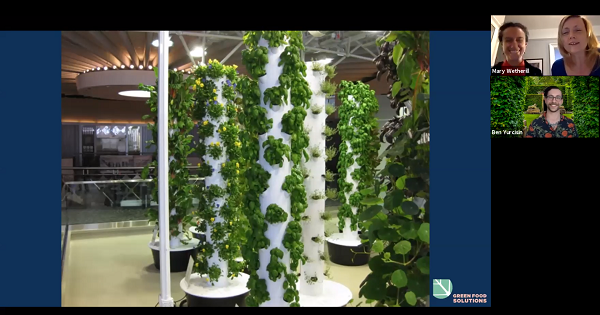Green Food Solutions of Jersey City Says its Mission is to Create a Locally Sourced Food-Tech Ecosystem
Jersey City Tech Meetup held a Zoom video get-together on April 15 that featured a virtual fireside chat hosted by organizer Ben Yurcisin.
The guests of honor were the cofounders and principals of Green Food Solutions (GFS): Mary Wetherill, CEO; and Electra Jarvis, farming director. GFS is a Jersey City business that successfully uses technology to both disrupt and enhance the traditional farming process.
The company’s mission is to “empower a new local food system, for our health and the health of our planet.” Their ultimate vision is the creation of a locally sourced food-tech ecosystem that provides freshly harvested food for all, including the residents of cities, where food can be sourced from local urban farms and rooftop gardens, from above and below ground.
To help achieve their commendable goal, they offer free planning services, as well as in-person and online training for businesses, institutions and home hobbyists. Their team also sells, installs and maintains urban farms and gardens, utilizing vertical hydroponic and aeroponic technology.
GFS looks forward to a world where schools, restaurants, and residential and commercial buildings will all have their own farms or access to nearby farms for fruits, vegetables, flowers and plants.
According to Wetherill, “Half of the top ten leading causes of death are directly related to the food choices we are all making.” GFS therefore seeks to develop a nutrient-dense and sustainably grown array of produce.
In addition to the machinery and available space, you’ll need a water source, plus seeds and minerals, which are provided at purchase. The water should be tested in advance to confirm that it has the appropriate pH level for growing produce.
If the above isn’t enough to entice you into becoming an urban farmer, you might be swayed by the results of a prominent study by the National Aeronautics and Space Administration (NASA). It found that vertical farms, such as the ones sold and managed by GFS, grow fruits and vegetables two to three times faster than conventional soil-based farming.
Importantly, outdoor hydroponic cultivation requires surprisingly little electricity. Temperatures above 55 degrees provide the best conditions. Although colder temperatures will not necessarily harm the plants, the growing process will likely be slowed down or stopped altogether if the cold weather persists.
With hydroponic and aeroponic plants, roots are suspended in midair, with no soil required. This is especially favorable for those who aren’t enamored with the idea of getting down in the dirt or with the rarely enjoyable process of weeding one’s garden. As long as one has an ample vertical area to work with, this type of farming is a highly efficient use of available floor space.
Among the more prominent urban rooftop-garden projects in the region is at the Denizen luxury complex, comprising 900 rental units in Brooklyn. In a survey cited by GFS, satisfied tenants named their rooftop garden as a top amenity that had ultimately drawn them to this unique building.
In a neighboring borough, Greenwich Village-based Bell Book & Candle restaurant grows several dozen ingredients in its aeroponic rooftop garden. According to its website, sage, dill, cilantro and four types of cherry tomatoes are but a small sampling of what’s growing above the diners on the restaurant’s roof.
Baseball stadiums are also getting into the proverbial local/tech-enhanced growing act, including Boston’s famed Fenway Park. Unfortunately, it is eerily quiet there these days due to the Major League Baseball (MLB) decision to delay the start of its season amid the COVID-19 crisis, which is sadly causing many to wonder about the sustainability, security and long-term availability of food sources.
When the Red Sox are in town again, Fenway’s farm-to-table EMC Club restaurant will be serving up deliciously healthy meals to game attendees, with fresh produce sourced from Green City Growers, in partnership with Recover Green Roofs and Fenway Farms. A group called Lovin’ Spoonfuls also donates its excess food to local community organizations.
On the educational front, STEM (Science, Technology, Engineering and Math) and STEAM (Science, Technology, Engineering, Arts and Math) school programs are increasingly incorporating tech-based farming into their curriculums. In addition to being able to enjoy the tasty fruits of their labor, students can learn many valuable nonfarming skills in the process, such as data collection and statistical analysis.
What about cannabis, you ask. Yes, said the GFS ladies at the meetup event — at least in states such as Massachusetts and an expanding list of others where use by adults is legal. In fact, they said that “it grows like a weed” (pun intended).
The biggest challenge for vertical farming? Jarvis and Wetherill admitted that many people have issues with system cleaning, although this only needs to be done once every six months, and typically takes only about a half hour.
If you are growing outdoors, a power-washer treatment twice a year can do the trick. Indoor systems require more hands-on cleaning processes, but many people successfully use bathtubs or showers to wash their modular systems.
In terms of pricing, a home system can set you back approximately $620, which can be paid for monthly over a year. Adding indoor lights will push the price tag close to the $1,000 mark.
A video of the meeting is available here, courtesy of the Jersey City Tech Meetup.




